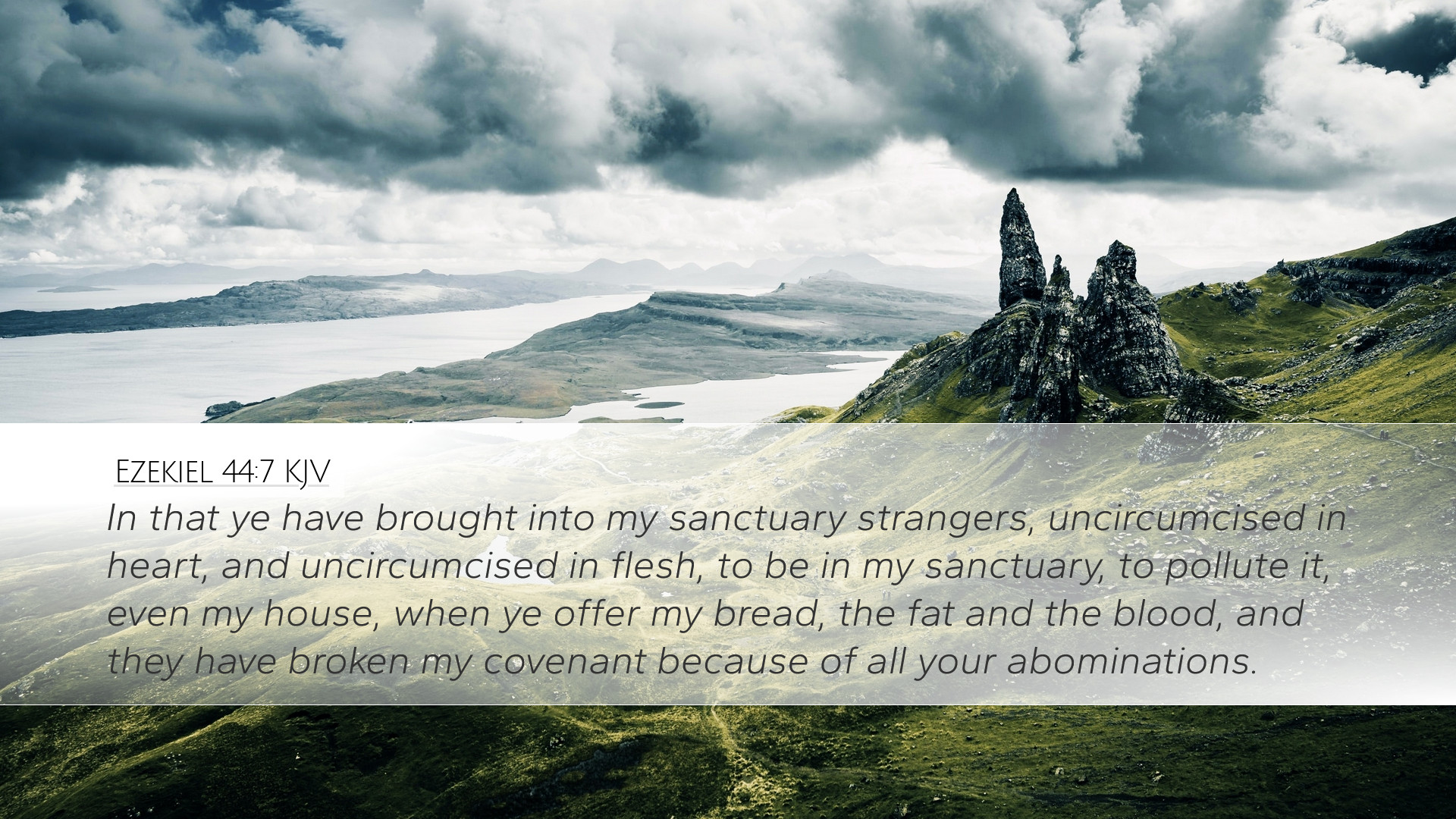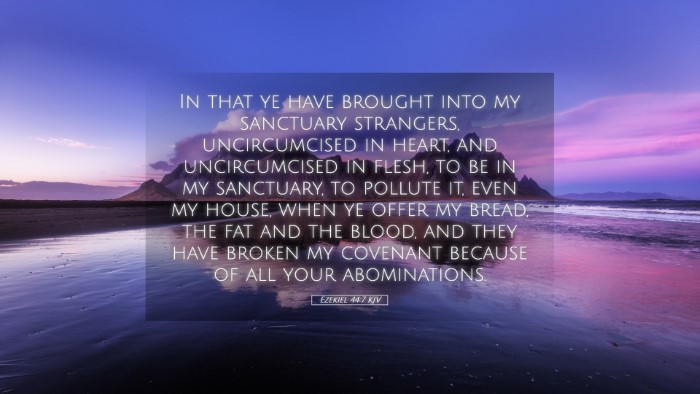Commentary on Ezekiel 44:7
Ezekiel 44:7 (ESV): “In bringing in foreigners uncircumcised in heart and uncircumcised in flesh, to be in my sanctuary, profaning my temple, when you offered my food, the fat and the blood. And you have broken my covenant in addition to all your abominations.”
Introduction
This verse from Ezekiel highlights significant themes of holiness, exclusion, and covenant fidelity within the context of God’s sanctuary. It reflects the prophetic voice of Ezekiel during a time of national crisis and calls for a restoration of the sanctity of worship. Through the insights provided by notable public domain commentaries, this analysis will examine the theological implications and the practical applications of this passage for contemporary readers.
Theological Insights
The central message in Ezekiel 44:7 revolves around the concept of holiness, specifically as it relates to the worship practices within the temple. Ezekiel’s condemnation of the presence of “foreigners”—those uncircumcised in heart and flesh—serves as a reminder of the seriousness with which God regards His covenant people and their worship life.
Matthew Henry's Commentary
Matthew Henry emphasizes the importance of separateness from sin and secular influences. He argues that the uncircumcised represent those who have not undergone the inward transformation that symbolizes true faithfulness to God. For Henry, the term “uncircumcised in heart” conveys a lack of genuine commitment to God’s covenant. Thus, he views the profaning of the temple as a dire consequence of allowing unregenerate individuals access to sacred practices meant for God’s holy people.
Albert Barnes's Notes
Albert Barnes elaborates on the implications of allowing “foreigners” into the sanctuary. He posits that the temple is designed to facilitate communion between God and His people, and therefore the entry of those with unclean hearts corrupts its sanctity. Barnes underscores the notion that God’s covenant is binding and that disobedience not only offends God but also disrupts the community's spiritual integrity. He believes that the foreigner’s presence symbolizes spiritual compromise and deviation from God’s intended worship.
Adam Clarke's Commentary
Adam Clarke provides a historical perspective regarding the role of the temple and its regulations concerning worship. He notes that in Hebrew culture, purity laws were essential in defining who could approach God. Clarke interprets the “uncircumcised in heart” as indicative of those who may outwardly observe rituals but lack a true inward transformation of spirit. He stresses that the essence of being part of God’s covenant community is not merely external practices but an authentic relationship with God.
Implications for Worship
This verse has profound implications for worship today. It challenges contemporary believers to examine the condition of their hearts as they approach God in worship. The warnings given by Ezekiel about the consequences of allowing unfaithfulness into the worship space serve as a reminder that integrity in worship involves both individual and corporate fidelity to God’s covenant.
Holiness in Worship
- Self-Examination: Just as the Israelites were called to ensure their hearts were right before God, today's believers are urged to engage in regular self-examination.
- Covenantal Commitment: The covenant, as highlighted in this passage, speaks to the importance of being in a genuine relationship with God, rooted in obedience and love.
- Guarding the Sanctuary: Church leaders are reminded of their responsibility to uphold the sanctity of worship, ensuring that practices reflect true adherence to the teachings of Scripture.
The Context of Ezekiel's Prophecy
Understanding the context in which Ezekiel delivered this message is crucial. His prophecies were given during the Babylonian exile, a period characterized by significant turmoil for the nation of Israel. The focus on purifying the sanctuary becomes a metaphor for God's desire to restore a broken people to Himself.
Judgment and Restoration
The inclusion of foreign elements into the worship setting was not merely a legalistic concern; it represented a larger prophetic theme of God’s judgment upon His people for their unfaithfulness. The prophetic voice often called for a return to holiness and a rejection of the cultural influences that led them astray. Yet, this call was also accompanied by the hope of restoration—a promise that God would once again dwell among His people.
Conclusion
In conclusion, Ezekiel 44:7 serves as a critical reminder to both individual believers and the church as a whole about the importance of maintaining a holy and reverent attitude towards God and His temple. Drawing from the insights of Matthew Henry, Albert Barnes, and Adam Clarke, we recognize that true worship is rooted in the condition of one’s heart and genuine commitment to God's covenant. This passage beckons readers to reflect upon their own practices, ensuring that they engage with God not only through external rituals but with a heart that is transformed and aligned with His will.


